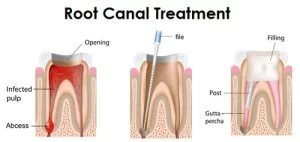Root Canal Treatment
My Tooth Hurts..Do I Need A Root Canal.. ??
Best dentist in Nashik
A toothache can cause anxiety, especially when you’re worried about what to do and how much it will cost.
It can be scary to think that you might need an invasive procedure or lose a tooth, but it’s important to know that your dentist is here to help.
A toothache can indicate a serious problem, but your dentist can intervene and take the right steps to help preserve your tooth’s function.
If your tooth hurts or is sensitive or swollen, it might be the result of decay, which means it can be easily fixed through root canal therapy.
Tooth decay begins when bacteria eats away the enamel, and you can tell it’s happening when it hurts to bite or chew.
This is because the enamel has weakened and there is less protection between the underlying nerves and the outside.
Best dentist in Nashik

When the decay is advanced, it can affect the deeper structures of the tooth, including blood vessels and nerves, causing pain even when you are not applying pressure.
If tooth decay is detected early, it can be easily repaired with a simple composite filling or similar restorative technique.
When the decay becomes an infection that spreads beyond the outer layers of the enamel and invades the pulp and root, root canal therapy is usually necessary.
Best dentist in Nashik
What is a root canal?
Root canal treatment may be a medical procedure that relieves pain caused by an Associate in Nursing infected or abscess. Throughout the basis canal method, the inflamed pulp is removed.
The surfaces within the tooth area unit then cleansed and disinfected, and a filling is placed to seal the house.
When is a root canal needed?
Root canal medical aid is important once oral bacterium invade the pulp inside your tooth. This typically happens once a cavity is left untreated for a protracted time. It also can occur if your tooth becomes cracked or broken because of trauma.
Best dentist in Nashik
How long does a root canal take?
Depending on the number of infections in your tooth, passageway medical aid might need one or 2 appointments. On average, a passageway takes concerning 30 to 60 minutes to finish.
If you’re having treatment on a bigger tooth with multiple roots, it will take up to an hour and a half.
Best dentist in Nashik
What happens during the root canal process?
Before starting your passageway, your health care supplier can take dental X-rays of the affected tooth. This helps confirm the extent of injury and ensures that passageway medical aid is that the acceptable treatment possibility.
Here area unit the steps that may be completed throughout your passageway procedure:
1. Anesthesia. First, local anesthesia is given to numb the infected tooth and therefore the encompassing gums. There are medications utilized in odontology to assist you relax, like inhalation general an anesthesia, oral sedatives or endogenous (IV) sedation. Your health care supplier might advocate sedation if you struggle with dental anxiety.
2. Dental dam placement. Before starting passageway treatment, alittle rubber dam is placed over the world. This isolates the tooth and keeps it dry throughout the procedure.
3. Access hole. Next, alittle gap is created within the crown of the tooth to access the pulp.
4. Pulp removal. small dental instruments area unit wont to take away the nerves, blood vessels and tissues within the tooth.
5. Shaping the canals. Once the pulp is removed, the pulp chamber and root canals area unit cleansed, disinfected and formed.
6. Filling the canals. The empty canals area unit then full of a versatile, rubbery dental material referred to as gum.
7. Protection the tooth. Next, a brief dental filling is placed to seal the tooth and stop bacterium from re-entering.
8. Putting the ultimate restoration. In most cases, you’ll would like a dental crown to shield the treated tooth and restore your bite. Crowns area unit custom-built, and fabrication typically takes 2 to a few weeks.
once your crown is prepared, the temporary filling is removed and therefore the permanent crown is placed. In some instances, you will be able to receive a crown throughout identical appointment.
Best dentist in Nashik
Signs Of Infection
- Minimal To Severe Pain.
- Tooth Discoloration.
- Swelling & Irritation In Surrounding of Gum Tissues.
- Signs Of Infection Can Be Visible By Radiograph.
Caring For Your Teeth After Root Canal
Best dentist in Nashik
Taking excellent care of your teeth will guarantee they stay healthy and functional for a lifetime.
As a root canal treatment patient, you should follow these care tips after your appointment in our Raisoni Dental Center to ensure your dental work lasts a lifetime:
- Eat a healthy soft diet until the crown and the permanent restoration is placed
- Meet your dentist regularly (every 4-6 months) for a hygiene appointment
- Brush your teeth twice daily for 2 minutes with a soft or electric toothbrush
- Floss daily or use a water flosser (Waterpik)
- Get a dental x-ray taken of the root canal once a year to ensure proper healing

